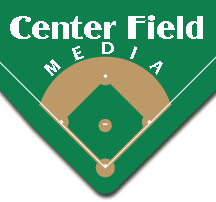Links
• Center
Field
• Love
of the Game
• Timeline
Today
• CF
Media
• E-mail |

The summer of 1997 in sports

BY NATHAN BIERMA
While the
Red Wings were the long-awaited champions, for the
Chicago Bulls it was "Been there,
done that" after their title.
The Red Wings' championship
had been their first in decades;
the Bulls' was their fifth this
decade. Only the Houston Rockets
could also boast being crowned
NBA kings in the 90's, winning it
all in 1994 and '95, sandwiched
between 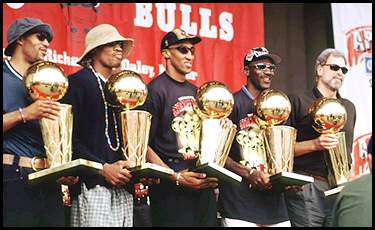 the
Bulls' three-peat and the
Bulls' three-peat and
this latest back-to-back.
And Chicago's two-year championship
hiatus had corresponded,
not coincidentally, with Michael
Jordan's brief and ill-fated
baseball career, leaving many to
wonder to what extent Chicago's
dominance might have been defined
had His Airness not landed
for that brief stint, and if the Bulls
might now be chasing Boston's
seemingly unreachable achievement
of eight straight titles
in the 1960's (the one constant in that
tumultuous decade).
They dedicated it to the
working people of Chicago at yet
another downtown victory
parade, as though looking for some
remaining use for yet another
trophy, yet another long season
ending with a familiar outcome.
But in contrast to those for
whom it was won, the 1997
championship came, Finals aside, with
little toil and tears.
It had been another steamroller season
for Chicago, not as numerically
impressive last year's 72-win
feat, but dominant nonetheless.
The eccentric Dennis Rodman
stayed away, for the most
part, from behavior burdensome to teams
of years past, and the team
as a whole once again avoided
injuries. Despite
a roster that without Jordan and Scottie
Pippen few teams envied,
the Bulls' team-oriented triangle
offense, seemingly outdated
and out-of-place in today's NBA,
clicked to combine with
again stifling defense for another
dominant year. The
Bulls reached the Finals in high gear, having
dropped only two playoff
games, and with their superstar, Jordan,
hungry to prove that he,
not Finals opponent Utah's Karl Malone,
deserved to be the MVP.
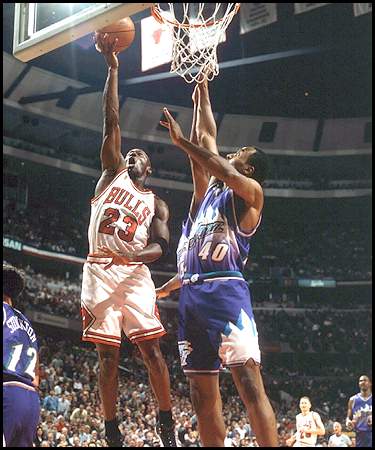 The
1997 NBA Finals provided the drama that had been missing The
1997 NBA Finals provided the drama that had been missing
in the regular season and
playoffs up to this point. Utah, in
its first Finals appearance,
proved undaunted by the ominous task
of opening in Chicago, where
the Bulls had seemed especially
invincible. The Jazz
fought to a tie with the Bulls in Game 1
with seconds to go and regular
season MVP Karl Malone at the free
throw line. His famous
pre-shot mumbling failed as he missed
both shots and opened the
door for Jordan heroics at the other
end of the court.
Jordan gathered the in-bounds pass, found
himself one-on-one with
Utah's Bryon Russell with five seconds
left, and ran the clock
down to one before launching a 20-foot
fadeaway, right on the mark
as the buzzer sounded. Predictable,
but memorable nonetheless.
The decisive Game 6 brought an
unlikely hero as Steve Kerr
knocked down a straightaway 18-footer
to put the Bulls ahead with
seconds to go. After Scottie
Pippen's steal and sliding
pass setting up Toni Kukoc's buzzer-
beating dunk, the United
Center erupted. The Bulls, having
finished their drive for
five, put their unstoppable machine in
park, sat back, and sighed,
a familiar sigh, but still swelling
with satisfaction.
But some noticed a touch
more meaning in this
celebration. It was
the fifth such in seven years, but some
picked up signs of trying
to savor this a bit more, player
embraces that lasted just
a second longer. For the city knew
well that this sight, by
now so familiar, could be the last such
for some time. Even
as the incredible machine rolled to another
title, whispers in the background
discussed its dismantling. The
contracts of Jordan and
coach Phil Jackson expired with this
championship, and without
them the Bulls, dominant as they seemed
this season, were just another
also-ran. 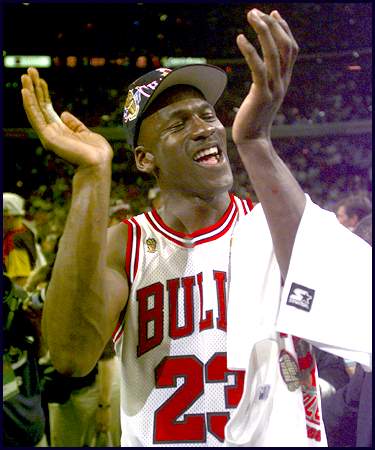 Each demanded the
Each demanded the
other's presence next year
for a return, but even then hinted
that a next year would be
the last.
When the NBA Draft came around,
looming the least
interesting in years, the
off-the-court, behind-the-scenes drama,
that of the general manager
telephone sort, began. In the works
was a monster trade to send
Scottie Pippen to the Boston Celtics,
the franchise whose legacy
remained the Bulls' toughest opponent,
though now crippled by lack
of talent and leadership. University
of Kentucky mastermind Rick
Pitino was brought in to combat both
of those problems, and wasted
no time in offering the Boston-
owned 3rd and 6th picks
for Scottie Pippen.
This tested the Bulls brain
trust. There was no question
its unprecedented dynasty
was in its twilight, yet with another
year to possible squeeze
out of it, was rebuilding premature?
This could be the best opportunity
to shore up the long-term
future of the franchise,
but would the fans forgive them for
breaking up the greatest
show in sports the city of Chicago had
ever seen? The rumor
mill had the vacationing Michael Jordan
step in and call off the
trade with a threat to leave himself,
and the deal fell through.
Pitino, visibly disappointed,
announced the drafting of
Colorado guard Chauncey Billups, and at
6 selected Ron Mercer, whom
he coached at Kentucky the last two
years. Picked first
was Tim Duncan, heads and shoulders above
the rest of the talent-thin
field depleted by early exits the
last few years. Keith
Van Horn was chosen second by
Philadelphia, for whom he
said he didn't want to play, then
traded to New Jersey in
a multi-player deal.
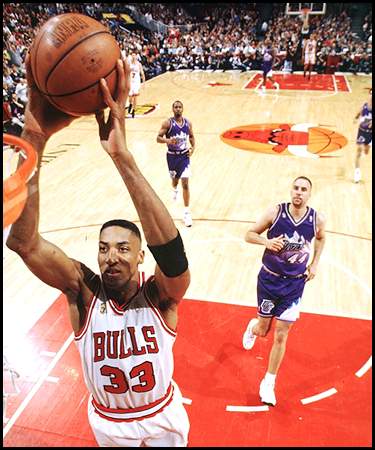 In
the end the Bulls remained intact, and all signs showed In
the end the Bulls remained intact, and all signs showed
them determined to sign
Jordan and Jackson for another title run.
Amid arguments as to whether
it was the greatest dynasty ever,
the team just barely survived
the whims of general managers with
its integral components
in place. Perhaps this provided the
firmest ground for proclaiming
the Bulls the best in history: the
Celtics of the 60's and
Lakers of the 80's never dealt with the
front office factor to the
extent the Bulls had--with the odious
terms such as salary cap
and free agency. Indeed, these had been
Chicago's fiercest opponents
in the absence of an on-court
marquee rivalry.
So while the sports world
yawned at the Bulls' winning it
all yet again this year,
the city of Chicago didn't seem to mind
the familiarity. It
realized the rarity of its team, not just in
the ranks of Chicago sports,
but in the history of sports as a
whole. And draft day
showed that such rarity can only increase
in today's topsy-turvy NBA,
where change is the only constant,
money the greatest motivation.
Chicago knew its Bulls were a
throwback, not only in their
selfless on-court style, deviating
only for the great Jordan,
not just by their insatiable and
unmatched desire to win,
but also in their relative longevity and
sustained dominance in a
decade that seemed to insure a league
trend against anything long-term.
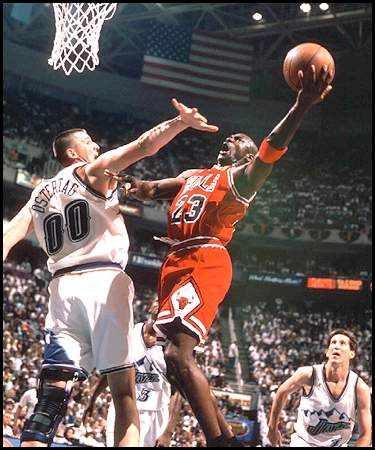 The
Bulls may return to win a sixth title next year in their The
Bulls may return to win a sixth title next year in their
curtain call before exiting
the stage on which such an unusual
story unfolded. But
whether they meet success yet again, to the
groans of the rest of the
country at the renewed redundancy, or
bow out in less appropriate
fashion, Chicago will be sure to take
a moment to appreciate,
as it did this year, its team and what it
accomplished this decade.
Then the Bulls will fade away, leaving
a league swirling in waves
of uncertainty, consumed by change,
blinded by dollar signs,
suffocated by selfishness, and wondering
how a team like the Chicago
Bulls so recently, so earnestly, so
effortlessly, and so successfully
defined dominance in sports.
 

The Summer of 1997 in Sports
Hockey:
Triumph and Tragedy
Basketball: One for the ages, again
Boxing:
Dismemberment and disgrace
Golf:
Two tough to take |


 the
Bulls' three-peat and
the
Bulls' three-peat and

